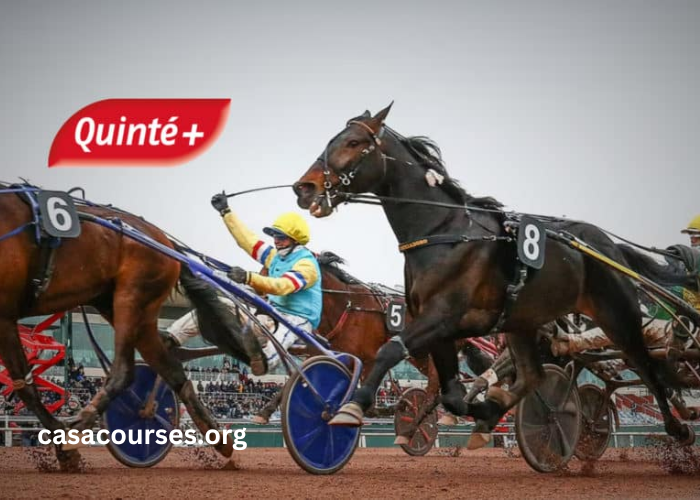In the intricate world of horse racing, Turf Monnaie represents a crucial aspect of betting strategy and financial management. This concept is essential for those who wish to enhance their betting success and make informed decisions. By delving into the principles of Turf Monnaie, punters can better navigate the complexities of horse racing, optimize their strategies, and ultimately increase their chances of winning. This comprehensive guide explores the core elements of Turf Monnaie, offering valuable insights and practical tips for achieving betting success.
What is Turf Monnaie?
Turf Monnaie, a term derived from the intersection of horse racing (“turf”) and finance (“monnaie” which means money in French), refers to the strategic management of funds allocated for betting purposes. It encompasses various techniques and approaches used to maximize returns on investment while managing risks effectively. This concept is not just about placing bets but involves a structured approach to managing one’s betting budget, understanding odds, and applying analytical skills to make well-informed decisions.
The Importance of Financial Management in Betting
Effective financial management is crucial in horse racing betting, as it helps bettors avoid common pitfalls and sustain their betting activities over the long term. Without proper financial planning, bettors may face significant losses and struggle to recover. Turf Monnaie emphasizes the importance of setting a budget, tracking expenses, and making disciplined betting decisions to ensure that betting remains a sustainable and enjoyable activity.
Setting a Betting Budget
The foundation of Turf Monnaie lies in setting a clear and realistic betting budget. This budget should be based on an individual’s financial situation and betting goals. A well-defined budget helps prevent overspending and ensures that betting remains a controlled and manageable activity. It is essential to allocate a specific amount of money for betting, separate from other financial obligations, and to stick to this budget regardless of wins or losses.
Tracking and Analyzing Betting Expenses
Monitoring and analyzing betting expenses is another critical aspect of Turf Monnaie. Keeping detailed records of bets placed, outcomes, and associated costs allows bettors to evaluate their performance and identify patterns or areas for improvement. This analysis helps in understanding which strategies are effective and which need adjustment, ultimately leading to more informed and strategic betting decisions.
Risk Management and Bankroll Protection
Risk management is integral to the concept of Turf Monnaie. Effective risk management involves diversifying bets, avoiding high-risk wagers, and protecting one’s bankroll from substantial losses. Bettors should aim to place bets that align with their budget and risk tolerance, and they should avoid chasing losses by making impulsive or irrational bets. By maintaining a disciplined approach, bettors can protect their bankroll and sustain their betting activities over time.
Understanding Horse Racing Odds
To effectively apply Turf Monnaie principles, bettors must understand horse racing odds and how they impact potential returns. Odds represent the likelihood of a horse winning a race and determine the payout for a successful bet. There are several types of odds formats, including fractional, decimal, and moneyline, each offering a different way to express probability and potential returns.
Fractional Odds
Fractional odds, commonly used in the UK, are presented as a fraction (e.g., 5/1). The numerator represents the potential profit from a winning bet, while the denominator represents the stake required. For example, 5/1 odds mean that for every $1 wagered, the bettor can win $5 in profit plus the original stake.
Decimal Odds
Decimal odds, widely used in Europe and Australia, are expressed as a decimal number (e.g., 6.00). This format includes both the potential profit and the original stake in the total payout. For instance, decimal odds of 6.00 mean that a $1 bet would result in a total return of $6, including the original stake.
Moneyline Odds
Moneyline odds, primarily used in the US, are presented as either positive or negative numbers (e.g., +500 or -200). Positive odds indicate the amount of profit from a $100 bet, while negative odds show the amount needed to wager to win $100. For example, +500 odds mean a $100 bet would yield $500 in profit, while -200 odds require a $200 bet to win $100.
Analyzing Horse Racing Form and Statistics
Successful betting involves analyzing horse racing form and statistics to make informed decisions. Turf Monnaie incorporates the evaluation of various factors that influence race outcomes, such as the horse’s past performance, jockey and trainer statistics, track conditions, and race distance.
Form Analysis
Form analysis involves reviewing a horse’s recent performance in races to assess its current condition and potential for success. Key aspects of form analysis include examining the horse’s finishing positions, times, and consistency over recent races. Bettors should also consider the level of competition faced and any notable improvements or declines in performance.
Jockey and Trainer Statistics
The performance of jockeys and trainers can significantly impact a horse’s chances of winning. Analyzing statistics related to jockey and trainer success rates, as well as their historical performance on specific tracks, provides valuable insights into potential outcomes. Bettors should consider factors such as the jockey’s experience, riding style, and recent form, as well as the trainer’s track record and ability to prepare horses for success.
Track Conditions and Race Distance
Track conditions and race distance play a crucial role in horse racing outcomes. Different horses perform better under specific track conditions, such as firm or soft ground. Similarly, race distance can affect a horse’s performance, with some horses excelling in shorter sprints while others thrive in longer races. Bettors should assess the relevance of track conditions and race distance to the horse’s previous performances to make informed betting decisions.
Developing a Winning Betting Strategy
A well-structured betting strategy is essential for implementing Turf Monnaie principles effectively. Developing a winning strategy involves setting clear goals, selecting appropriate betting markets, and applying systematic approaches to betting.
Setting Clear Goals
Establishing clear and achievable betting goals is the first step in developing a winning strategy. Goals may include achieving a specific return on investment, improving betting accuracy, or mastering particular betting markets. Clear goals provide direction and focus, helping bettors stay motivated and measure their progress over time.
Selecting Betting Markets
Choosing the right betting markets is crucial for implementing a successful strategy. Different betting markets offer various opportunities and risks, such as win bets, place bets, and exotic bets (e.g., exactas, trifectas). Bettors should select markets that align with their expertise and research, focusing on those with the best potential for profitability.
Systematic Approaches to Betting
A systematic approach to betting involves using data-driven methods and strategies to inform betting decisions. This may include employing betting systems, analyzing historical data, and applying statistical models to predict outcomes. Systematic approaches help bettors make objective decisions based on evidence rather than intuition or emotion.
Common Pitfalls and How to Avoid Them
Despite careful planning and strategy, bettors may encounter common pitfalls that can negatively impact their success. Understanding these pitfalls and knowing how to avoid them is crucial for maintaining effective Turf Monnaie practices.
Emotional Betting
Emotional betting occurs when bettors make decisions based on feelings rather than objective analysis. This can lead to impulsive and irrational bets, resulting in losses and financial strain. To avoid emotional betting, bettors should stick to their established strategy, maintain discipline, and avoid making bets under stress or excitement.
Chasing Losses
Chasing losses involves placing additional bets in an attempt to recover previous losses. This approach often leads to further losses and financial difficulties. To prevent chasing losses, bettors should adhere to their budget, accept losses as part of the betting process, and avoid making hasty decisions to recoup losses.
Overcomplicating Strategies
Overcomplicating betting strategies can
lead to confusion and ineffective decision-making. While it’s important to have a well-thought-out strategy, overly complex systems can be difficult to manage and may not yield better results. Bettors should focus on straightforward, proven strategies that align with their skills and experience. Keeping strategies simple and adaptable ensures better execution and reduces the risk of errors.
The Role of Technology in Turf Monnaie
Digital Tools and Resources
The integration of technology has revolutionized the field of horse racing betting, providing bettors with a wealth of digital tools and resources to enhance their strategies. Betting platforms, statistical databases, and predictive analytics tools offer valuable insights and streamline the betting process.
Online betting platforms provide access to a range of betting markets, odds, and real-time data. These platforms often feature user-friendly interfaces and advanced features such as live streaming, in-play betting, and automated betting options. Utilizing these tools helps bettors stay informed and make timely decisions.
Statistical databases offer detailed information on horse racing form, jockey and trainer performance, and track conditions. Analyzing this data helps bettors identify trends and patterns that can inform their betting choices. Predictive analytics tools use algorithms and historical data to forecast race outcomes, providing additional insights for decision-making.
Mobile Betting and Apps
Mobile betting has become increasingly popular, allowing bettors to place bets and access information from their smartphones or tablets. Mobile betting apps offer convenience and flexibility, enabling users to manage their betting activities on the go. Many apps also provide features such as notifications, account management, and betting tips.
The convenience of mobile betting encourages more active and engaged participation, making it easier for bettors to stay updated on races and odds. Mobile apps also often include tools for managing budgets, tracking bets, and accessing historical data, supporting effective Turf Monnaie practices.
The Psychological Aspect of Betting
Managing Expectations
Understanding and managing expectations is a critical aspect of successful betting. Bettors should approach horse racing with realistic expectations, recognizing that losses are a natural part of the betting process. Setting achievable goals and maintaining a balanced perspective helps prevent frustration and discouragement.
Maintaining Discipline
Discipline is essential for implementing effective Turf Monnaie strategies. Bettors should adhere to their budget, follow their betting plan, and avoid deviating from their established strategy. Maintaining discipline requires self-control and the ability to resist impulsive decisions.
Building Confidence
Building confidence through informed decision-making and consistent results is important for long-term success in betting. Confidence should be based on data, analysis, and experience rather than luck or intuition. Developing confidence involves continuously improving one’s skills and knowledge while remaining open to learning from mistakes.
Conclusion
Turf Monnaie represents a comprehensive approach to managing finances and strategies in horse racing betting. By understanding the principles of financial management, odds, and strategic planning, bettors can enhance their chances of success and enjoy a more controlled and rewarding betting experience. The integration of technology, awareness of psychological factors, and adherence to effective strategies further contribute to successful betting outcomes. With a disciplined approach and a focus on informed decision-making, bettors can navigate the complexities of horse racing and achieve their betting goals.



